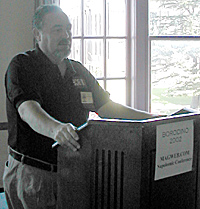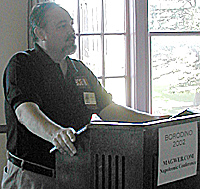 Once you joined the army, you were pretty much in uniform for life. Either the war is over or you are wounded or killed. How you felt about that on a battlefield depended on six factors:
Once you joined the army, you were pretty much in uniform for life. Either the war is over or you are wounded or killed. How you felt about that on a battlefield depended on six factors:
- personality of leader: a good one motivates the troops;
comraderie: don't run out of the "area of influence" of your fellow soldiers;
honor: from private to officer, this is a motivator;
fear: disorients at times and pulls against soldier's duty;
nationalism: fighting for your country; and
ideology: less an issue as the actual battle approaches.
Accounts of battle are either intensely personal or dispassionately collective from the survivors' points of view. What you will not find is an after action report of the dead. Thus, it is difficult to determine whether the dead made conscious efforts to stand and fight, or got hit before they could face that decision point of stay or flee.
These are also histories of the literate, and since most troops were illiterate, you get a skewed viewpoint of battle conditions. The primary sources were often written years after the battles: most in the 1815-1830 time period. As anyone knows, there's loss of accuracy the longer someone waits to put down thoughts on paper. And since most of the aristocrats wrote the majority of the memoirs, you'll read plenty about glory and honor and so forth, but little about fear or cowardice.
Few accounts mention cowardice. Usually, if the winner is writing, the memoirs are about heroics, not cowardly acts. If a loser wrote about such a situation, it often makes excuses or places blame. And the age-old antagonism between officers and enlisted is often cited: foot soldiers blame poor leadership while officers blame bad soldiers. If a foot soldier wrote about a losing battle, the decision to flee was often stated as a response to a hopeless situation -- whether that was a reality, a perception, or an excuse is debated. Oddly enough, the more causalties, the more heroic the action.
One of the few accounts of an all-out rout is written by a British Sgt.-Major in the Guards about fleeing from the French, dropping muskets, etc. Although it has all the hallmarks of a rout, the Sgt.-Major calls it a "withdrawal."
Artillery does not seem to have the big effect that we attribute to the era. It often comes across as a constant din in the battle, with survivors noting it caused more irritation than fear.
Memoirs and other descriptions offer an idealized portrait of coordinated attacks and neat lines, and these were intended for public consumption. The reality of the Napoleonic battlefield was quite a different story.
A Napleonic battle took several hours before it reached a decisive event. Chaos is the best word to describe it, and comanders would receive many different pieces of information over the course of the battle. Napoleon's genius was rooted in his ability to filter through the contradictory reports. At Borodino, for example, each side was not sure of what the other was doing.
 Point of Decision
Point of Decision
The point of decision, that is, whether to stay or flee, on a Napoleonic battlefield is quite different than on a modern one or even an ancient one. Weapon technology has much to do with that point.
A Greek hoplite or Roman legionnaire had a point at about 25 meters, because that's about the time they had to decide whether to charge into the opponent's weapons or not. By the Napoleonic wars, that point was at about 125m, or about the range of a semi-accurate musket shot. In WWII, it was out about 300-400m, about the range of a rifle shot. In the Gulf War, it was about 3,000m or about the range of a tank shot.
Arguably, you could make the case about being in artillery range, or aircraft range, or even intercontinental missile range, but these three longer-range weapons are not necessarily in a soldier's control. Anonymous incoming artillery shells provide a sense of detachment in that one spot is just about as good as another--burrow in and hope for the best. Indeed, some of these can provoke anger and increase resolve, like the British in WWII during the Blitz or in North Vietnam under US bombardment. The key point in an artillery barrage is after the rounds stop and troops press forward.
Yet, morale changes over time as perceptions change and as cultures change. Our current ideas of glory versus death are different from 19th Century ideas. For example, from a command position, there is a "mentality of operational risk" that is emerging that concerns economy of forces. Commanders are evaluating the chance of failure with a small force, where losses could equal 500, versus the chance of absolute success with losses of 10,000.
In WWII, Japanese infiltration tactics would cut off defenders. In Malaysia, the British would try to escape or surrender. In the Phillipines, Phillipine soldiers would see it as an opportunity to kill off isolated Japanese units. The Japanese fought under the assumption that "duty is as heavy as a mountain, but death is light as a feather."
The point is when you can see an enemy that you can do something about, either by staying and accepting combat or fleeing. This point is altered depending on weapons, formations, and tactics. In the Napoleonic wars, the limited range weapons forced close-in tactics and tight formations. These formations were designed not only in terms of maneuver, but in terms of fostering a sense of community. As presures mounted, that "community" might break, or it might stand.
More Borodino 2002 Napoleonic Conference
- Welcome, Introduction, and the Hotel Chamberlain
Borodino Ballroom
MagWeb.com Napoleonic Speakers Conference
Friday Lecture: Bob Coggins: Napoleonic Unit Frontages and True Linear Scale
Friday Lecture: Frank Chadwick: The Russian Army at Borodino
Friday Lecture: Jean Lochet: Preparation of French Cavalry for Campaign of 1812
Friday Tour: Fort Monroe Casemate Museum
Friday Keynote Lecture: Dr. William J. Gregor: Long Shadow of Napoleon on American Military Planning
Friday Lecture: Jean Lochet: The Attempt to Rebuild the French Cavalry for 1813
Saturday Lecture: Kevin Zucker: The French Army of 1812
Saturday Lecture: Dr. James H. Birdseye: Glory or Shame? The Role of Morale on the Napleonic Battlefield
Saturday Lecture: Dr. George Nafziger: Prelude to 1812: The 1809 Campaign in Poland
Special Guest: Lt. Col. Andrey Pavlov: Deputy Military Attache from the Russian Embassy
Saturday Lecture: Glenn Drover: Napoleonic Game Design and Production
Saturday Lecture: Jean Lochet: The Peace Conference of Prague: Negotiations with Napoleon During the 1813 Armistice
Video Presentation: Dr. Ben Weider: Borodino Re-enactment 1997
Video Presentation: Austerlitz and Sharpe
Re-enactor Presentations: Russians and French
Borodino: The Wargame
Side Wargames: Survivor, et al.
Awards Banquet
Back to List of Conventions
Back to Travel Master List
Back to MagWeb Master List of Magazines
© Copyright 2002 by Coalition Web, Inc.
This article appears in MagWeb (Magazine Web) on the Internet World Wide Web.
Other military history articles and gaming articles are available at http://www.magweb.com